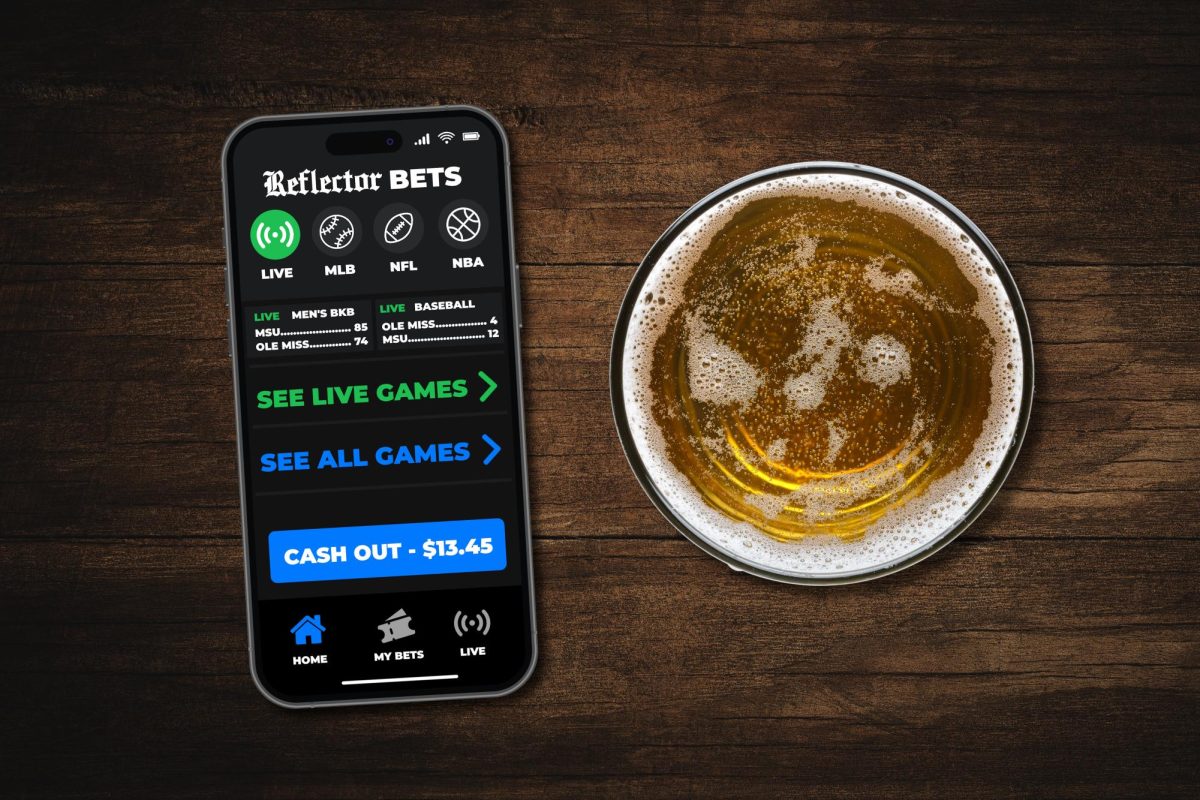Feb. 1, 2024, the Mississippi House of Representatives passed a bill to legalize online sports betting. While this is an exciting development, there is an uncomfortable conversation we should all be having regarding it.
Sports betting, for me, is a fun and interesting concept. I love its ability to engage people with sports they do not usually watch, and how it can bring people together that otherwise would not interact. It also seems to me as something indicative of a greater issue — ignorance in accepting the consequences of certain actions.
In college today, there are a few phrases that everyone recognizes. The two I want to mention are “You cannot be an alcoholic in college” and “Drunk cigs do not count.” I find that these phrases are used as a crutch to justify, as well as to discredit, the consequences of these actions.
The more people bet on sports, the more popular that the satirical statistic of “99% of bettors give up right before winning big” becomes as well.
According to Aden Carter, a sophomore majoring in software engineering, sports betting is an ever-growing industry, and it is not hard to get into.
“There’s definitely been a growth in the amount of people betting. The market has grown a crazy amount and the advertisement has risen as well,” Carter said.
As the issue of underage bettors was brought up, Carter continued, saying “the number of apps to sports bet makes underage betting very easy. All it takes is an older family member or friend to verify an account and deposit. In my experience, after that initial verification there would not be a barrier that could prevent an underage person from simply using that account as much as he or she wanted, barring losing all money in said account.”
Not only is sports betting easy to get into, it is also most often indulged in by those vulnerable to developing addiction.
According to online data resource Ipsos, “Sports bettors are more likely to be men, under the age of 35, white or high-income earners. Some of these demographics — particularly men and those under the age of 35—are known to be at a higher risk of gambling addiction.”
As previously mentioned, sports betting being legalized in the state ultimately is not an immediate cause for concern, but it can lead to deeper issues that may go ignored. Likewise, the normalization of alcohol and nicotine use in college students leads to many deep seeded issues.
According to the DSM-5, a manual on mental disorders, there are 11 aspects of Alcohol Use Disorder, and having as little as two of them apply to an individual within the last year makes them fit the criteria.
An example of two of the eleven points that fit the bill to most college students would be where the DSM-5 states both, “Spent a lot of time drinking? Or being sick getting over the aftereffects?” as well as when it states, “Had times where you ended up drinking more, or longer than you intended?” Both of these statements are very often true of students who drink.
Therefore, most college students that drink fit the bill of the first sub-classification of Alcohol Use Disorder in the DSM-5, which has led to the prominence of the phrase “you cannot be an alcoholic in college,” meaning that since “everyone” in college is an alcoholic, no one really is.
While rooted in at least understandable reasoning, as it is only in reference to the “Mild” sub-classification of AUD, this has led to be seen as true whole-scale, which is simply not the case.
For example, according to the National Library of Medicine, “a recent study by Hartzler and Fromme (2003a) suggests that people with a history of blackouts are more vulnerable to the effects of alcohol on memory than those without a history of blackouts.”
Alcohol has a snowball effect. One that, without firsthand experience, takes time to realize. I myself learned this towards the end of my junior year, when I realized I was falling victim to issues with alcohol that I had not realized I had.
The normalization of unhealthy relationships with alcohol in college not only harms students, but it ruins their relationships with those around them as well. It too enables the gateway to other issues.
Finally, the issues with nicotine go unnoticed as well. This is not to say that students do not recognize that nicotine products have drawbacks, but rather how easy they are to get hooked on.
According to CNN Business, “Philip Morris International announced [February 8th] that it shipped about 350 million cans of Zyn in 2023, a whopping 62% growth compared to the previous year. Shipments typically correlate to sales even if they represent a slightly different measure of demand.”
The demand of nicotine products is going up naturally due to an increase in safer nicotine delivery systems, but it is not uncommon to hear about nicotine addictions starting as an innocent cigarette when drinking. While it was difficult to find specific statistics on the concept, it does add to the point that the consequences of certain actions among college students are often thrown to the wayside.
At the end of the day, we are college students. Everyone expects us to make dumb decisions, but recently we have failed to acknowledge long term issues that can come from them. We refuse to accept alcohol overuse until we graduate, we ignore the consequences of cigarettes every time we drink and soon we will be given the power to sports bet en masse.
Sure, for many, nothing may come of this, but the power to gamble away your money for rent is one college students need to be well aware of, rather than ignore the consequences as things are now.








maryo • Mar 28, 2024 at 5:17 pm
with any online activity, it’s important for users to be mindful of their security and to manage their time effectively to maintain a healthy balance between gaming and other life activities. Overall, online gaming websites continue to push the boundaries of digital entertainment, constantly introducing new technologies and experiences to captivate gamers worldwide.